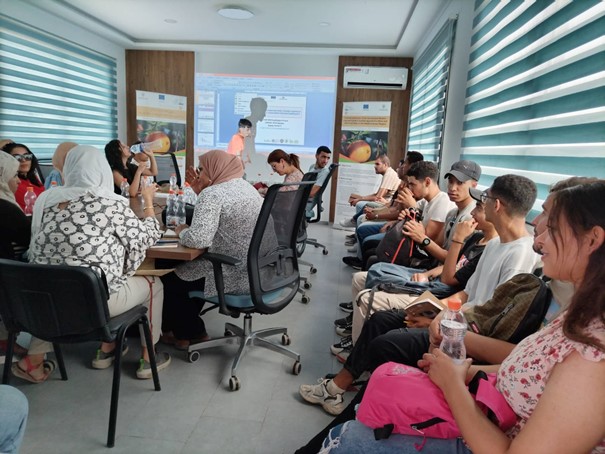
Du: Au:
The MedFlyNet in-field demonstration event at Khlidia site, in Tunisia
The use of e-traps to monitor the Medfly, Ceratitis capitata in peach orchard and how the implement the Location Aware System (LAS)”
An open dissemination event about the use of electronic traps for monitoring MedFly in orchards and the implementation of the Location Aware System (LAS) in peach orchards was organized by the Regional Research Centre on Horticulture and Organic Agriculture (CRRHAB) Chott-Mariem, with the cooperation of Olive Institute on September 19, 2023. The event took place at the Mabrouka Company, which hosted the FruitFly net-ii project field experiments. Around 70 people attended: Citrus and stone fruits growers, PhD students, researchers, engineers, specialists in plant protection, private plant protection companies, agricultural engineers and technicians from the public agriculture sector.
The welcome address provided by Professor Mohamed Braham, the local project coordinator, who also presented the FruitFlyNet-ii project, its objectives, and some results already achieved. He also highlighted the good cooperation with the Mabrouka Company, for the facilitation and help in applying the field experiments. Then from Mabrouka Company, the engineer Sondes Telmoudi, presented the society and emphasized the good cooperation between CRRHAB Chott-Mariem and the Mabrouka company.
Afterthat, Professor Mohamed Braham outlined how the program would unfold: the first part would be devoted to scientific presentations in the meeting room (session 1), and the second to a demonstration in the peach orchard (session 2). So, the participants were divided into two groups. The first one attended data show the presentations, while the second followed the demonstration (operation of e-traps, geo database, data collection via GPS and tablet) and then the groups rotated.
Professor Mohamed Braham's talk entitled “Presentation of the FruitFlyNet-ii project and the importance of the Mediterranean fruit fly, Ceratitis capitata in Tunisia” emphasizing the problem of MedFly and the importance of collaboration between Mediterranean countries to control this insect and detailed how to implement the Location Aware System (LAS) in Tunisia.
Then, Dr. Ines Ksentini, the local project coordinator from the Olive Institut gave a presentation entitled “Importance of the olive fly, Bactrocera oleae in Tunisia and implementation of a monitoring system“. She focused on the importance of the olive fruit fly, Bactrocera oleae, as the main insect pest of olive crops worldwide, directly affecting olive oil quality and olive production. With the technical team, Manel Ben Ameur and Dr. Marwa Bouri, she introduced the LAS prototypes regarding the e-trap functioning and the e-services.
Regarding field demonstration, Mr. Hassib Ben Khedher (technical manager), Ahmed Moussa (informatics engineer), and Amal Lamouchi, from the technical team of the CRRHAB presented the process and steps needed to the implementation of the LAS, how to operate the field digitization and geospatial data collection like field borders, tree location, protected area, organic farms, cultivars, location of traps and habitat location. Then, they introduced the e-traps operating mode in the peach orchard: how the e-traps work, when and how the system takes images of the trapped insects glued in sticky plates, how it is powered, etc. The technical team did its best to simplify and explained the e-trap system for participants.
Discussions that followed each presentation were fruitful and very interesting and interactions among attendees (students, teachers, researchers, engineers, technical managers of farms, entomologists) made interesting debates of technical, economic and environmental concerns.







